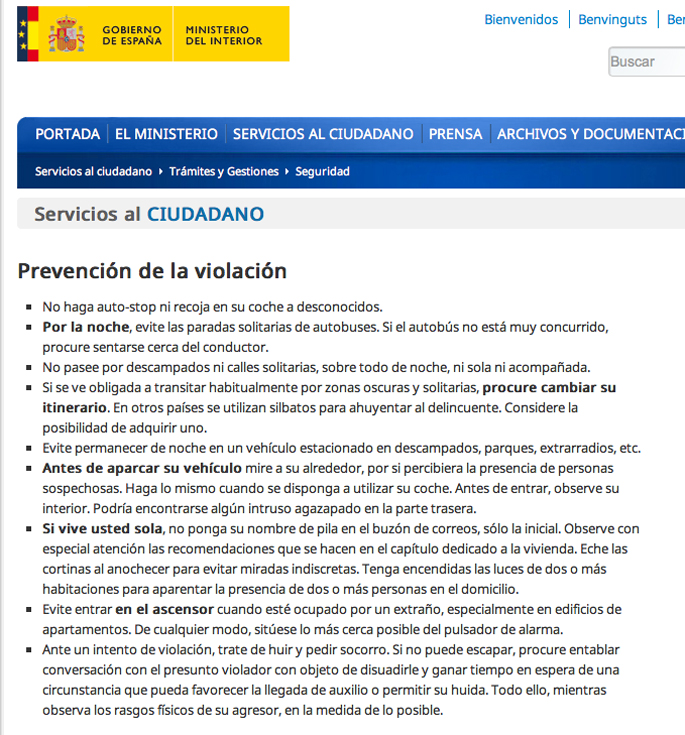
Imagine: suddenly you can't walk on the street at night, you can't use the elevator (because a stranger can come in), you have to keep on the lights of two or three rooms at home so nobody thinks you live alone. No, the reason isn't that you've been threatened, just that you're a woman. These are some of the recommendations that the Spanish Ministry of the Interior makes to women to prevent violations. The recommendations issued by the Bilbao City Hall through a leaflet are similar, but the only one they propose against sexual violence is that women limit our freedom.

Feminists use the concept of “sexual terror” to describe that in this patriarchal society rape serves to keep us under control. Patriarchs don't like free, daring women who don't need men next door. It is preferable to promote dependence and fear on a continuous basis. The ghost of rape is blackmailing systems. The message is clear: if we break the gender norms (walking alone in the street; getting drunk; wearing short clothes; linking; taking off the t-shirt in sanfermines...) and raping us, the fault will be ours. Guilt and shame are the main obstacles in reporting sexual violence. The victims believe they will be tried, and in many cases they are, remembering the questions they asked their mother about their life during Nagore Laffage's trial.
We know that most sexual assailants are known to the victims (family, boyfriend, husband, neighbor, colleague, crew mate, lover, militant partner...). And in these cases, it's harder to identify and report aggression. But public institutions, instead of giving that data (according to the Sexual Violence Association ADAVAS, only 15% of the rapists are unknown to the victim), prefer to be told to women that they have to be afraid and that they feel mistrust towards all men.
In order to deal with an attempt at rape, the Ministry of the Interior recommends trying to escape and asking for help. “If it is not possible to flee, engage in discussions with the alleged rapist in order to dissuade his intent and gain time,” the list of recommendations states. The Government does not believe that self-defence is an option. It's not about Kill Bill becoming the protagonist of the movie. But experts in the prevention of sexual violence, such as Sharon Marcus, among others, say that many women have managed to stop the aggressor with a strong comment, push or hard scream, even when the aggressor carried a weapon. According to Marcus, male power is not based on physical superiority, but on the prejudice that women are helpless beings. The key to stopping sexist aggression is to flip that power relationship.
I've often talked in this column about feminist self-defense, which is fundamental, that transforms our lives. Detecting normalized aggressions, detecting risk situations, working what we communicate through our bodies, developing strategies to deal with harassment, getting out of physical aggression ... We learn those things and many more things. Above all, we internalize that we have the right to live in freedom, that we should not assume the role of victim, that we should not always wait for the savior, that we are strong. As public institutions continue to adhere to the message “Be careful!”, it is essential to share self-defense knowledge among us and for the story of Caperucita to invent different ends.